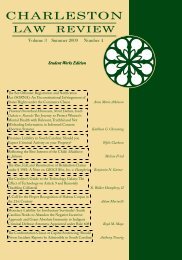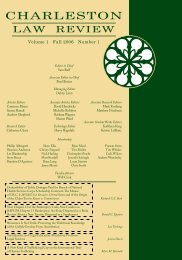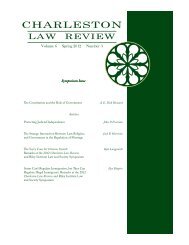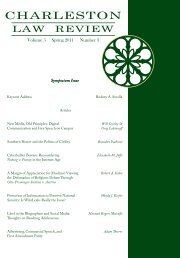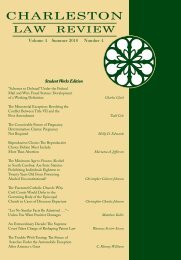Volume 5 Winter 2011 Number 2 - Charleston Law Review
Volume 5 Winter 2011 Number 2 - Charleston Law Review
Volume 5 Winter 2011 Number 2 - Charleston Law Review
You also want an ePaper? Increase the reach of your titles
YUMPU automatically turns print PDFs into web optimized ePapers that Google loves.
SCHULZE FINAL.doc1/20/<strong>2011</strong> 6:14PM<strong>2011</strong>] <strong>Law</strong> School Academic Supporta.How <strong>Law</strong> Schools Traditionally Failat Providing Relatedness ................................. 327b. Academic Support Methods’ Rolein Providing Relatedness ................................. 327VI. CONCLUSION ...................................................................... 330I. INTRODUCTIONA problem exists in law schools on the issue of academicsupport. While some schools now include extensive academicsupport opportunities within their curricula, many other schoolsdevote few resources to this endeavor while simultaneouslyadvertising to the contrary on their websites. Although manylaw schools boast of pervasive academic support services forstudents, oftentimes the truth is that one administrator orfaculty member serves as the sole avenue of academic support,and that person’s overall duties dwarf the amount of time theyspend on support. So why do some schools find it crucial toadvertise academic support but fail to fund it adequately?Perhaps a law school administration’s reticence to commitsubstantially to academic support is predicated upon an inabilityof those programs to guarantee demonstrable results. Althougha dean’s definition of the term “results” might differ from that ofthe faculty, generally both parties want to see two things: betteracademic performance by the law school’s students and anincrease in the rate at which the school’s graduates pass the barexamination. As a result, proponents of academic supportprograms have generated articles attesting to demonstrateempirical evidence of such results. 1 Meanwhile, naysayers1. See Leslie Yalof Garfield & Kelly Koenig Levi, Finding Success in the“Cauldron of Competition”: The Effectiveness of Academic Support Programs,2004 BYU EDUC. &L.J. 1, 24 (2004) (arguing that “there was a significantdifference between” the first-semester GPA of the participants in the WorkshopSeries to those of all non-participants); Linda Jellum & Emmeline PauletteReeves, Cool Data on a Hot Issue: Empirical Evidence that a <strong>Law</strong> School BarSupport Program Enhances Bar Performance, 5 NEV. L.J. 646, 648 (2005)(“[S]tatistical analysis supports the conclusion that a bar support program[housed within the ASP] has improved the University of Richmond School of<strong>Law</strong>’s bar passage rate.”); Adam G. Todd, Academic Support Programs: EffectiveSupport Through a Systemic Approach, 38 GONZ. L.REV. 187, 189 (2002–2003)271



